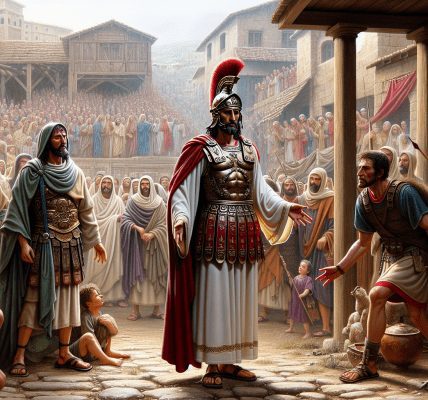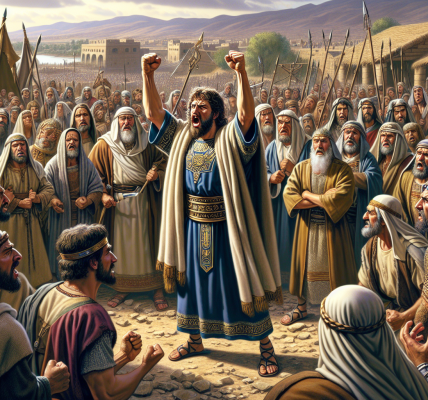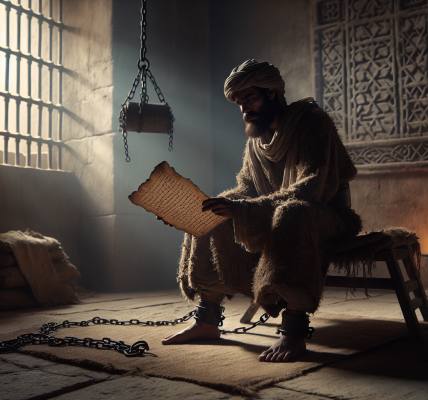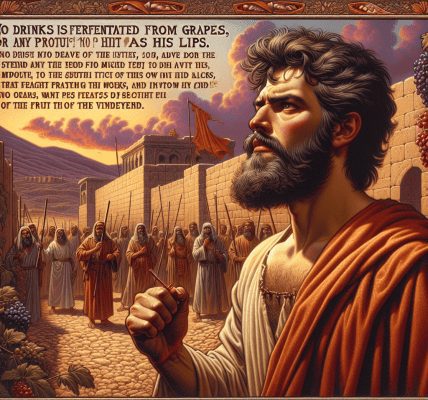**The Generosity of the Macedonian Churches**
The sun hung low over the rugged hills of Macedonia, casting long shadows across the dusty roads where the apostle Paul and his companions traveled. The air was thick with the scent of olive groves and the distant murmur of village life. Though weary from their journey, their hearts burned with a story that needed to be told—a story of faith, sacrifice, and the surprising grace of God at work among the believers in Macedonia.
Paul paused beneath the shade of a gnarled fig tree, his fingers tracing the edge of a well-worn scroll. Beside him, Titus listened intently as Paul began to recount the marvel that had unfolded among the Macedonian churches—Philippi, Thessalonica, Berea—places where the Gospel had taken root in the midst of hardship.
“Brother,” Paul said, his voice steady yet filled with emotion, “I must tell you of the grace God has poured out upon the Macedonians. You know well the trials they have endured—persecution, poverty, distress that would shake even the strongest of souls. And yet…” He paused, shaking his head in wonder. “And yet, their joy in Christ overflowed in a wealth of generosity.”
Titus leaned forward, his eyes alight with curiosity. “How so?”
Paul smiled. “Though they were poor—indeed, *deeply* poor—they begged us for the privilege of giving to the saints in Jerusalem. Not only did they give what they could, but they gave beyond their means, freely and joyfully!”
The memory stirred Paul’s spirit. He could still see the faces of those Macedonian believers—weathered hands pressing coins into the collection, widows offering their last mites, families sacrificing portions of their own meals so that others might eat. There was no coercion, no grudging obligation—only a love that refused to be silenced by circumstance.
“And here is the wonder of it,” Paul continued, unrolling the scroll slightly. “They gave themselves first to the Lord, and then to us, by the will of God. It was not merely money they offered, Titus—it was their very hearts.”
A warm breeze rustled the leaves above them as Paul’s words settled between them. The lesson was clear: true generosity was not measured by the size of the gift, but by the surrender behind it. The Macedonians had understood what so many missed—that giving was an act of worship, a tangible echo of Christ’s own sacrifice.
Paul’s voice grew earnest. “This is why I urge the Corinthians—indeed, all the churches—to excel in this grace of giving. Not as a command, but as a test of the sincerity of their love. For you know the grace of our Lord Jesus Christ, that though He was rich, yet for our sakes He became poor, so that we through His poverty might become rich.”
Titus nodded slowly, the truth resonating in his heart. The Gospel was not just words; it was a life poured out. And if Christ had given everything, how could His people do less?
As the sun dipped below the horizon, Paul rolled the scroll carefully, his mind already turning to the letter he would send to Corinth—a plea not to guilt, but to grace. For in the end, it was not about equal shares, but equal sacrifice. Not about balancing ledgers, but imitating the One who had given His all.
And so, under the darkening Macedonian sky, the story of the churches’ generosity became more than a memory—it became a living testimony, a call to all who would follow Christ: to give not out of surplus, but out of surrender; not from compulsion, but from a heart made rich by His poverty.
For such was the way of the Gospel. And such was the path of true grace.




